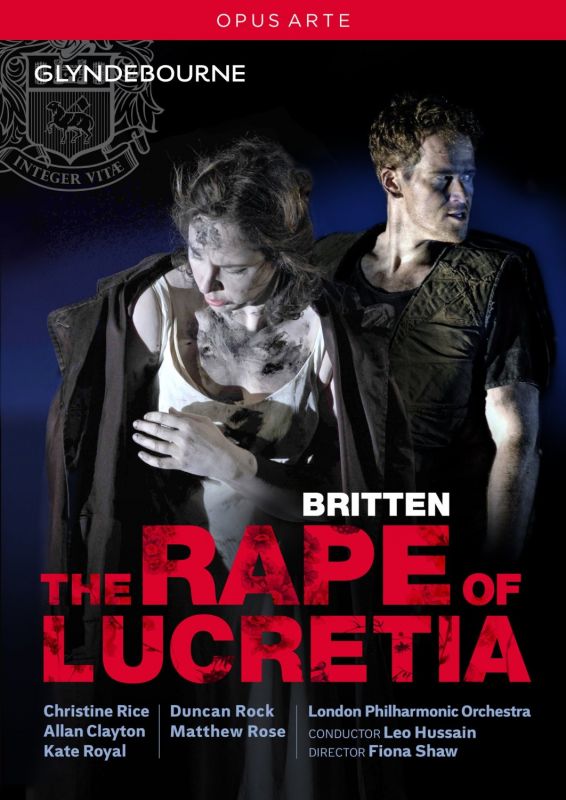BRITTEN The Rape of Lucretia
View record and artist detailsRecord and Artist Details
Composer or Director: Benjamin Britten
Genre:
Opera
Label: Opus Arte
Magazine Review Date: AW16
Media Format: Digital Versatile Disc
Media Runtime: 114
Mastering:
DDD
Catalogue Number: OA1219D

Tracks:
| Composition | Artist Credit |
|---|---|
| (The) Rape of Lucretia |
Benjamin Britten, Composer
Allan Clayton, Male Chorus, Tenor Benjamin Britten, Composer Catherine Wyn-Rogers, Bianca, Mezzo soprano Christine Rice, Lucretia, Mezzo soprano Duncan Rock, Tarquinius, Baritone Kate Royal, Female Chorus, Soprano Leo Hussain, Conductor London Philharmonic Orchestra Louise Alder, Lucia, Soprano Matthew Rose, Collatinus, Bass Michael Sumuel, Junius, Bass-baritone |
Author: Tim Ashley
The aftermath of the Second World War to some extent forms Shaw’s starting point. She dispenses with the idea that the Male and Female Choruses (Allan Clayton and Kate Royal) should be detached from the action and reimagines them as a pair of archeologists, themselves traumatised by war, who piece the opera’s narrative together from what they unearth during a dig, and whose relationship and beliefs are challenged by what they find. The concept allows Shaw to probe both the work’s unstable mix of pagan brutality and Christian moralising, and its sometimes troubling sexual politics.
Clayton develops an initial fascination with Tarquinius’s insistent sexuality, gleefully carrying him piggyback to Rome during the first-act interlude, before turning away in revulsion as the danger to Christine Rice’s Lucretia becomes increasingly clear. Royal, in a crisis of faith, soon abandons the Bible we find her clutching at the start and later proffers Lucretia the crucifix she wears round her neck in the unavailing hope of providing some comfort. In a scene which Shaw appears to have toned down between 2013 and 2015, the couple copulate, consensually but desperately, in the immediate aftermath of the rape.
Shaw is careful in her handling of the relationship between Lucretia and Duncan Rock’s Tarquinius. Rice’s smile when he arrives at her house suggests she both appreciates his looks and is flattered by his attentions. But she also establishes the sexual contentment Lucretia feels in her marriage to Collatinus (Matthew Rose), and we fully understand how Tarquinius’s actions so irrevocably tear her world apart. In her depiction of the marriage itself, however, Shaw departs from Britten. She gives the couple a daughter, who is frightened by noise during the rape, and in front of whom Lucretia later kills herself – a tacit evocation of the discussions of the ethics and consequences of suicide integral to the versions of Lucretia’s story by Livy, Augustine and Shakespeare. Rose, meanwhile, plays down Collatinus’s proprietorial attitude towards his wife’s fidelity. His statement that Lucretia should be ‘forgiven for what she has given’ is sung with deep affection, though it more accurately suggests a catastrophic failure of understanding on his part that directly precipitates her suicide.
It’s beautifully acted and sung. Rice wrings your heart throughout and her self-lacerating final scenes have a harrowing immediacy. Clayton and Royal are engrossing as their relationship buckles under strain before winning through to newly found mutual understanding: both are in fine voice; Royal, sometimes castigated for slipshod diction, has no difficulty projecting the text here. Rock, lethally handsome, superbly captures the violence beneath Tarquinius’s surface charm. Lyrical yet incisive in his approach, conductor Leo Hussain gets finely detailed playing from his LPO instrumentalists, with every flicker of colour speaking volumes. François Roussillon films it in remorseless close-up, which adds to the emotional nakedness of it all, though we could, on occasion, do with wider stage pictures. There’s enough detail in his camerawork, though, to allow us to see the way the archeological apparatus of ropes and plans at ground level gradually assumes a cruciform pattern as the piece progresses – something that I, for one, hadn’t noticed in the theatre.
Discover the world's largest classical music catalogue with Presto Music.

Gramophone Digital Club
- Digital Edition
- Digital Archive
- Reviews Database
- Full website access
From £8.75 / month
Subscribe
Gramophone Full Club
- Print Edition
- Digital Edition
- Digital Archive
- Reviews Database
- Full website access
From £11.00 / month
Subscribe
If you are a library, university or other organisation that would be interested in an institutional subscription to Gramophone please click here for further information.




